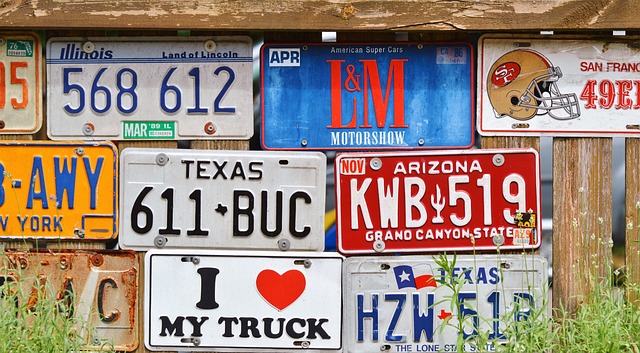When you hit the road, your vehicle’s license plate decals speak volumes about its legal standing. These personalized car stickers are more than just a design element; they are a critical component of vehicle registration that indicates compliance with state regulations. As a driver, it’s imperative to understand the role these decals play and how to manage them properly. This article delves into the significance of license plate decals as ‘License Plate Decals,’ ‘Personalized Car Stickers,’ and ‘Auto Tags and Titles.’ It guides you through the renewal process and deadlines, ensuring you’re never caught off guard by ‘Sticker Expiration Dates’ or unexpected ‘Vehicle Registration Fees.’ We’ll also cover obtaining replacement tags for vehicles to maintain your registration without a hitch. Stay informed to keep your driving privileges valid and avoid potential fines.
- Understanding the Role of Personalized Car Stickers in Vehicle Registration
- The Importance of License Plate Decals in Reflecting Current Registration Status
- Navigating Auto Tags and Titles: A Guide to Renewal Procedures and Deadlines
- Keeping Track of Sticker Expiration Dates to Avoid Penalties
- Managing Vehicle Registration Fees and Obtaining Replacement Tags for Vehicles
Understanding the Role of Personalized Car Stickers in Vehicle Registration

Personalized car stickers play a significant role in the vehicle registration process, serving as a clear indicator to law enforcement and regulatory bodies that a vehicle is properly registered. These stickers, often referred to as license plate decals or auto tags, are affixed to the rear of a vehicle and display the current registration period. They are issued by the Department of Motor Vehicles (DMV) or equivalent state agencies and must be visibly displayed at all times to avoid fines or legal complications. The stickers are updated annually, with new ones reflecting the correct sticker expiration dates, which are critical for maintaining compliance with vehicle registration laws. Owners must keep track of these dates as failing to do so can result in the vehicle being deemed unregistered, subjecting the owner to penalties and fines.
When it comes time to renew vehicle registration, individuals must pay the appropriate registration fees and ensure their personalized car stickers are up-to-date. Should a sticker become damaged or lost, vehicle owners need to apply for replacement tags through the DMV. This process often involves submitting an application along with the necessary fees and proof of vehicle ownership, such as auto titles. The timely renewal of registration and the procurement of replacement tags when needed are essential steps in upholding a vehicle’s legal standing on public roads. It is imperative for drivers to understand the role of these personalized car stickers and to adhere to the set sticker expiration dates to avoid any disruptions or fines associated with non-compliance.
The Importance of License Plate Decals in Reflecting Current Registration Status

License plate decals, commonly known as personalized car stickers or auto tags and titles, play a pivotal role in indicating a vehicle’s current registration status. These decals are affixed to the license plates of a vehicle and are updated annually to reflect the registration period for which a vehicle is legally licensed to operate on public roads. The importance of these decals cannot be overstated; they serve as a clear visual cue for law enforcement, which can quickly ascertain a car’s valid registration without needing to inspect documents within the vehicle. This immediate verification is invaluable, as it streamlines traffic stops and helps maintain the flow of vehicular traffic.
Furthermore, staying up-to-date with sticker expiration dates is essential for drivers to avoid potential fines and penalties associated with driving an unregistered vehicle. Vehicle owners must be aware of their sticker expiration dates and ensure that they renew their registration on time. The process for renewal includes not only paying the relevant vehicle registration fees but also applying for replacement tags if the existing decals are damaged, illegible, or stolen. Timely renewal is crucial; it ensures compliance with state regulations and contributes to the safety and orderliness of public roads. Additionally, having current license plate decals can be beneficial during insurance claims or legal disputes, as they confirm a vehicle’s registration status, which can affect coverage and liability determinations.
Navigating Auto Tags and Titles: A Guide to Renewal Procedures and Deadlines

When it comes to maintaining your vehicle’s registration, understanding the process for renewing Auto Tags and Titles is paramount. Each state has its own set of rules and deadlines for renewing License Plate Decals, so it’s essential to stay informed about these specifics. Personalized Car Stickers not only serve as a legal indicator but also enhance the aesthetic appeal of your vehicle. To avoid any disruptions in your driving privileges, keep track of your Sticker Expiration Dates and plan ahead for renewal.
The renewal process typically involves submitting an application along with the required Vehicle Registration Fees. This can often be done online, by mail, or in person at a local DMV office. It’s advisable to initiate this process well before your current stickers expire to ensure a smooth transition and to prevent any potential fines for non-compliance. If your existing Personalized Car Stickers are lost, damaged, or stolen, it’s important to procure Replacement Tags for Vehicles promptly. Most states offer a swift service for such scenarios, often with temporary tags provided while your replacement request is being processed. Staying on top of these details not only keeps you within the bounds of the law but also safeguards your vehicle against unauthorized use by others.
Keeping Track of Sticker Expiration Dates to Avoid Penalties

To maintain a clear understanding of your vehicle’s registration status and to avoid the inconvenience of penalties, it is imperative to keep track of personalized car sticker expiration dates. These stickers or license plate decals, which are often referred to as auto tags and titles, serve as a clear indicator of your compliance with state regulations. Typically issued annually by the Department of Motor Vehicles (DMV), these stickers must be prominently displayed on your vehicle’s registration area to reflect the current year. Missing this renewal deadline can result in fines or additional fees, making it crucial to stay vigilant about upcoming sticker expiration dates. To ensure you remain compliant without any lapses, set reminders well before the due date. The DMV provides clear guidelines and deadlines for vehicle registration fee payments and obtaining replacement tags for vehicles if necessary. Keeping abreast of these details can save you from unnecessary legal complications and financial penalties. By staying proactive with your vehicle’s registration renewal, you can enjoy a hassle-free driving experience. Remember to verify the specific requirements and deadlines in your state or region to ensure timely compliance with all regulations governing auto tags and titles.
Managing Vehicle Registration Fees and Obtaining Replacement Tags for Vehicles

Managing vehicle registration fees is a critical aspect of vehicle ownership that requires diligence and attention to detail. Motorists must stay abreast of their sticker expiration dates, as these indicate when their registration is due for renewal. The timely payment of vehicle registration fees ensures that personalized car stickers and license plate decals are up-to-date, reflecting the current registration period mandated by state laws. These stickers not only serve as a legal requirement but also facilitate the identification of your vehicle in official databases, such as Auto Tags and Titles. When it comes to replacement tags for vehicles, whether due to damage, loss, or theft, it’s imperative to act promptly. Most states provide an online platform or a local DMV office where vehicle owners can request these replacements. It’s essential to submit the necessary application form along with any required documentation and applicable fees for new stickers. The process typically involves providing proof of current registration, identity verification, and payment of vehicle registration fees for the new set of license plate decals. Keeping accurate records of your sticker expiration dates and understanding the procedure for obtaining replacement tags for vehicles ensures that you remain compliant with local regulations and avoid potential fines or driving infractions associated with an expired or missing registration sticker. Always check with your state’s DMV for specific requirements and guidelines to ensure a smooth renewal process.
In wrapping up our discussion on vehicle registration compliance, it’s clear that personalized car stickers, or license plate decals, play a pivotal role in signaling the legal status of a vehicle. As detailed throughout this article, from understanding their function to navigating renewal procedures, staying abreast of auto tags and titles is not just a formality but a critical aspect of responsible vehicle ownership. Vehicle owners must remain vigilant about sticker expiration dates to evade penalties and manage registration fees promptly. Should the need arise for replacement tags, acquiring them efficiently is facilitated by the guidance provided in our ‘Navigating Auto Tags and Titles’ section. It’s imperative to treat these regulatory measures as a testament to your commitment to safe and lawful driving practices.



